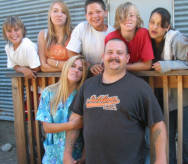
Belt-tightening has hardly started Like thousands of other American families the Buxton family’s life is on hold – stacked on shelves and piled into plastic bins in a corrugated metal warehouse behind a fire station in an industrial part of Sacramento, Calif.
For the past four months, the offices of a social service agency have been the closest thing they’ve had to call home.
Over in Citrus Heights, Calif., the Thomas family started out just trying to cut out frivolous stuff — Beanie Babies and Pokemon cards, bottled water and soda — with the goal of making life simpler and less expensive. Then a $300 electricity bill earlier this year kicked basic conservation into high gear.
”If you do a whole bunch of little things, it adds up,” says mom Michelle Thomas.
These two families illustrate life on different parts of the economic spectrum amid a downturn that has left no one unscathed. And with the recent economic quakes on Wall Street, many families are retrenching. The U.S. Census Bureau recently found that 37.7 million Americans are living in poverty, up from 36.5 million in 2006. (continues after ad)
THE BUXTONS
Robert Buxton, who spent six months in Iraq as a truck driver for the Army National Guard in 2005, is struggling to find work to sustain his family after being laid off from a welding job.
”This is a pretty low point in my life to be almost 40 years old and not have any tangible assets for my children,” says the 39-year-old father of three.
In May, the Buxtons decided to leave their lives in small-town Ripley, Tenn., where breaking even was a monthly effort. They stuffed their things in a storage unit, and Robert, his wife, Stacy, their three children and the family Labrador named Sugar piled into their 1995 Chevy Monte Carlo with a sticker that says, “God Bless the USA.”
It was Washington state or bust. They busted in Denver when the car’s water pump and alternator went out, and ate up all the savings they had. They made it to Sacramento, but had no place to call home.
Family Promise of Sacramento, a nonprofit that shelters homeless families, has been where the Buxtons shower and keep their changes of clothes. And every day, at 5 p.m., a shuttle picks them up from the day center to take them to various churches to eat and sleep.
It wasn’t what Robert Buxton expected when he left Tennessee. The three-bedroom house they rented there was comfortable enough. But his job as a welder took him away from his family — to Texas, to Arizona — and finally laid him off in December.
The West seemed promising. Maybe they could make more money, maybe there would be more work, maybe their children — Kaylan, 16, Paul, 12, and Savannah, 10 — would learn about diversity beyond black and white, Buxton says.
Instead, their toiletries have a permanent home in overnight bags, they share a shower and two bathrooms with nine others, they have rules like no TV before 3 p.m., and they have to tell their life story, over and over, to strangers at the different churches.
Now at the proverbial bottom, Buxton has a plan to climb out again. After weeks of searching for welding jobs at the local employment office, he found one a few weeks ago at a sheet metal company. He’s trying to save enough for a $1,200 deposit and $1,050 a month in rent for a three-bedroom house.
If that doesn’t work, there’s always re-enlisting in the active duty Army.
”We’re not here because of a drug and alcohol background,” Buxton says. “We’re here because of poor financial choices, and we’re trying to figure out how not to make poor financial choices in the future.”
